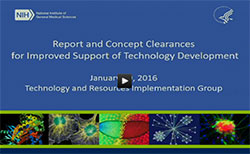This page is historical material reflecting the Feedback Loop Blog as it existed on
March 16, 2016. This page is no longer updated and links to external websites
and some internal pages may not work.
March 16, 2016
We would like to tell you about two new technology development initiatives recently approved by
our Advisory Council. These programs are part of an
ongoing effort that we’ve previously described to facilitate early stage, investigator-initiated work to create or improve tools for biomedical research.
Developing and providing access to technologies that enable biomedical research is a high priority for NIGMS, as expressed in our
2015 strategic plan. Historically, support for technology development has generally been coupled to using the technology to answer a biomedical research question. Although in the later stages of technology development this coupling is often useful, in the early stages it can hinder exploration of innovative ideas that could ultimately have a big impact on research.
We think the two initiatives briefly described below will stimulate early stage technology research and development by allowing scientists to focus on making the technology work before they begin to apply those tools to biomedical research questions.
Exploratory Research for Development of New Technologies: This program will support modest 2-year R21 grants aimed at figuring out how to develop a new technology or radically improve an existing one. Projects will be high-risk and have no preliminary data or immediate biomedical applications. Projects should identify the right approaches to take in developing the technologies further.
Focused Technology Development: This program will support R01 grants that are entirely focused on the development of an emerging technology with a strong potential to impact biomedical research. The program will not allow inclusion of a significant biomedical research problem because the technology will not be ready for that until after the project is over. These grants will be renewable only once.
We will be communicating with you about these initiatives and how they fit into the larger technology development landscape as they are rolled out.
If you have questions or comments about our plans, please
email Doug.
About the Authors
Before her retirement in March 2017, Jean managed research grants in membrane biochemistry and biophysics, transport and lipid metabolism, and she served as the NIGMS contact for Academic Research Enhancement Awards (R15). Her other activities included supporting the development and maintenance of research resources, such as the Lipidomics Gateway and the PSI:Biology Materials Repository.
Before transferring to NIH's National Institute of Dental and Craniofacial Research in October 2017, Doug co-lead the Biomedical Technology Research Resources program and served as the program director for the Models of Infectious Disease Agent Study. He also was the project team leader for the NIH Common Fund Technology Centers for Networks and Pathways program.

